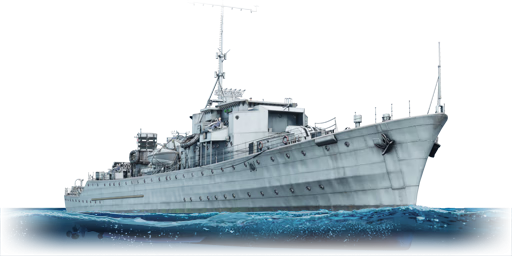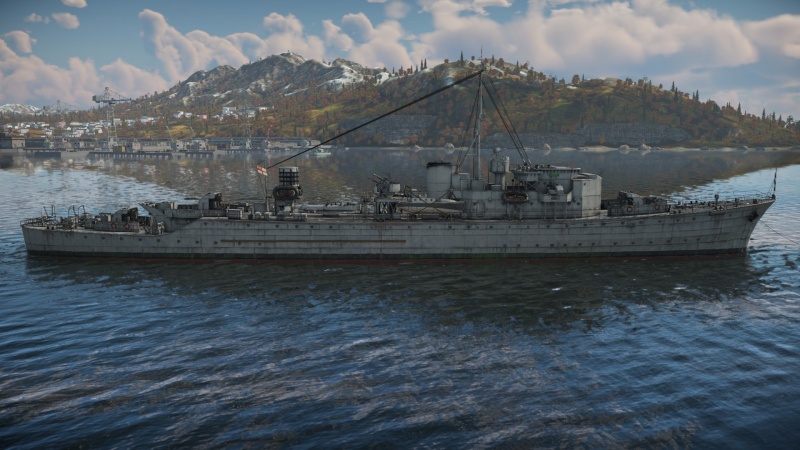HMS Brissenden
Contents
Description
The Hunt-class, HMS Brissenden (L79), 1943 is a rank II British destroyer with a battle rating of 4.0 (AB) and 4.3 (RB/SB). It was introduced in Update 1.95 "Northern Wind".
General info
Survivability and armour
Talk about the vehicle's armour. Note the most well-defended and most vulnerable zones, e.g. the ammo magazine. Evaluate the composition of components and assemblies responsible for movement and manoeuvrability. Evaluate the survivability of the primary and secondary armaments separately. Don't forget to mention the size of the crew, which plays an important role in fleet mechanics. Save tips on preserving survivability for the "Usage in battles" section. If necessary, use a graphical template to show the most well-protected or most vulnerable points in the armour.
Mobility
Write about the ship's mobility. Evaluate its power and manoeuvrability, rudder rerouting speed, stopping speed at full tilt, with its maximum forward and reverse speed.
| Mobility Characteristics | |||
|---|---|---|---|
| Game Mode | Upgrade Status | Maximum Speed (km/h) | |
| Forward | Reverse | ||
| AB | |||
| Upgraded | 59 | 18 | |
| RB/SB | |||
| Upgraded | 48 | 14 | |
Modifications and economy
Armament
Primary armament
Provide information about the characteristics of the primary armament. Evaluate their efficacy in battle based on their reload speed, ballistics and the capacity of their shells. Add a link to the main article about the weapon: {{main|Weapon name (calibre)}}. Broadly describe the ammunition available for the primary armament, and provide recommendations on how to use it and which ammunition to choose.
Secondary armament
Some ships are fitted with weapons of various calibres. Secondary armaments are defined as weapons chosen with the control Select secondary weapon. Evaluate the secondary armaments and give advice on how to use them. Describe the ammunition available for the secondary armament. Provide recommendations on how to use them and which ammunition to choose. Remember that any anti-air armament, even heavy calibre weapons, belong in the next section. If there is no secondary armament, remove this section.
Anti-aircraft armament
An important part of the ship's armament responsible for air defence. Anti-aircraft armament is defined by the weapon chosen with the control Select anti-aircraft weapons. Talk about the ship's anti-air cannons and machine guns, the number of guns and their positions, their effective range, and about their overall effectiveness – including against surface targets. If there are no anti-aircraft armaments, remove this section.
Additional armament
Describe the available additional armaments of the ship: depth charges, mines, torpedoes. Talk about their positions, available ammunition and launch features such as dead zones of torpedoes. If there is no additional armament, remove this section.
Usage in battles
Describe the technique of using this ship, the characteristics of her use in a team and tips on strategy. Abstain from writing an entire guide – don't try to provide a single point of view, but give the reader food for thought. Talk about the most dangerous opponents for this vehicle and provide recommendations on fighting them. If necessary, note the specifics of playing with this vehicle in various modes (AB, RB, SB).
Pros and cons
Summarise and briefly evaluate the vehicle in terms of its characteristics and combat effectiveness. Mark its pros and cons in the bulleted list. Try not to use more than 6 points for each of the characteristics. Avoid using categorical definitions such as "bad", "good" and the like - use substitutions with softer forms such as "inadequate" and "effective".
Pros:
Cons:
History
The Hunt class, HMS Brissenden (L79) was an escort destroyer of the Hunt class of small destroyers built for the Royal Navy. Built during the Second World War, the ship was completed to a completely different design than her predecessors including the L71, including the fitting of torpedo tubes. HMS Brissenden saw some service during the Second World War, including convoy escort duties in the Mediterranean and Arctic theatres. She remained in the Mediterranean theatre until 1947, when she was reduced to reserve and eventually scrapped.
Design and construction
The Hunt class was a class of small destroyer (or destroyer escort) designed specifically for convoy escort duties. Ordered at the beginning of the Second World War, the ships were intended to fulfill a variety of duties, primarily being of the convoy escort role. Their smaller size made them much more affordable than the larger fleet destroyers that the Royal Navy had in service, while their strong armament made them suitable for convoy escort. This was reflected in the numbers of ships built - in total, 86 Hunts were completed in four groups, many of which were given to foreign navies. HMS Brissenden belonged to the fourth and final group, of which there were only two vessels. She was laid down in February of 1941 and commissioned in February of 1943.
HMS Brissenden was completed to a different design than the previous three groups. She displaced 1175 tons standard and had a complement of 170. Her main armament consisted of six 4-inch (105 mm) guns in twin turrets, one fore and two aft. Brissenden also carried a secondary armament of a single quadruple Pom-Pom mount and several 20 mm Oerlikon guns. Unlike the other Hunts, HMS Brissenden carried a single triple 533 mm torpedo tube mount. Being an escort destroyer, Brissenden was only capable of making 26 knots (48 km/h). However, that was more than enough for the role she was meant to fulfill.
Operational History
After her commissioning in February of 1943, HMS Brissenden was commissioned into the British Home Fleet. She served there for just over 3 months before being assigned to the Mediterranean fleet for convoy escort and fire support duties. She was part of the escort force for the convoy WS31 towards Gibraltar and headed to Malta, where she provided fire support and patrol duties off of the Allied landings at Sicily. However, during this time, she suffered a collision with the destroyer Blankney and was severely damaged. As a result, she returned to the United Kingdom for repairs.
After the repairs were completed, Brissenden went on to serve as a convoy escort in the Arctic, escorting JW 54A to Iceland before turning back. She was also active in fleet defence during the time of the D-Day landings and engaged enemy light naval forces several times. In January of 1945, she returned to port for a refit, before rejoining the home fleet until July when she was transferred to the Mediterranean fleet. Brissenden remained in the Mediterranean after the war until 1947, when she was reduced to reserve in the UK. The ship was considered by Kuwait to become their Royal yacht, but this didn’t come through, and the ship was scrapped in 1965.
Media
Excellent additions to the article would be video guides, screenshots from the game, and photos.
See also
Links to articles on the War Thunder Wiki that you think will be useful for the reader, for example:
- reference to the series of the ship;
- links to approximate analogues of other nations and research trees.
External links
References
- Mason, G. B. (2004). HMS Brissenden, Escort Destroyer. Retrieved January 20, 2021, from http://www.naval-history.net/xGM-Chrono-10DE-Brissenden.htm
| Britain destroyers | |
|---|---|
| Town-class | HMS Churchill · HMS Montgomery |
| V-class | HMS Valhalla · HMS Vega · HMS Verdun |
| G-class | HMS Grafton · ORP Garland |
| Hunt-class | HMS Calpe · HMS Brissenden |
| Tribal-class | HMCS Haida · HMS Eskimo · HMS Mohawk |
| J-class | HMS Jervis |
| K-class | HMS Kelvin |
| N-class | HMAS Nepal |
| Battle-class | HMS Armada · HMS Cadiz · HMAS Tobruk |
| Daring-class | HMS Daring · HMS Diamond · HMS Diana |





